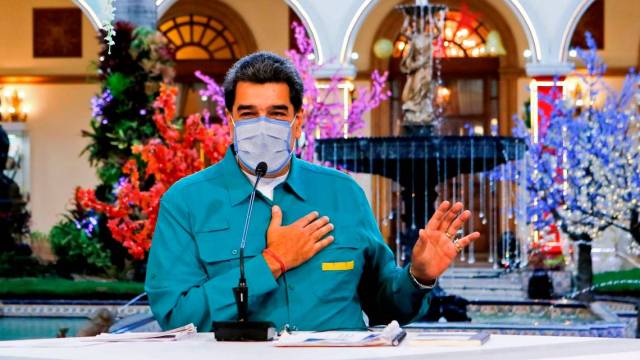
As countries scramble to gain access to a limited supply of coronavirus vaccines, political infighting is keeping Venezuela out of the race altogether, with Nicolás Maduro and the opposition accusing one another of blocking access to doses through a United Nations program.
By Antonio Maria Delgado and Jacqueline Charles / Miami Herald
The COVAX Facility, run in Latin America by the UN’s Pan American Health Organization, has set aside 1.4 million doses of the AstraZeneca vaccines for the oil-producing country, but they will not be distributed until Venezuela pays the $18 million it owes to the program, which is due Tuesday.
“There are still some issues regarding the payment because Venezuela is a country of high financing,” Dr. Jarbas Barbosa, assistant director of PAHO, said at a recent press briefing.
Paolo Balladelli, PAHO’s representative in Venezuela, added that, “It is essential to count on the support of all parties and proceed to the payment on February 9.”
COVAX appears to be the country’s best hope at gaining access to vaccines developed by pharmaceutical companies AstraZeneca and Pfizer. Maduro previously announced that he made arrangements to obtain about 10 million doses of the Russian vaccine Sputnik V, but it is not known how he plans to pay for them or when they would be available in Venezuela.
COVAX is a global vaccine-sharing initiative coordinated by the World Health Organization and other partners to ensure that poor nations have access to the shots. If approved, the program would provide inoculations for about 3% of the Venezuelan population.
Venezuela has 128,000 registered cases and 1,209 deaths, figures that are much lower than that that of neighboring countries, but members of the country’s scientific community have warned that they are likely underrepresented due to the low number of tests conducted in the country.
The U.S.-sanctioned Maduro regime, cash-strapped and with squeezed access to the international financial system, had hoped to obtain the money it needs for the program by selling a portion of the $2 billion in gold that the country has in Great Britain.
Those assets, however, are frozen pending the outcome of a trial under review by the British Supreme Court that in essence must determine who the U.K. deems is the true leader of Venezuela, Maduro or opposition leader Juan Guaidó, who Washington sees as the legitimate president of Venezuela.
Maduro’s government accuses Guaidó of denying the access to those funds because he wants to steal them.
“With the funds blocked abroad, Venezuela could easily pay for all the vaccines against COVID-19 to cover the more than 30 million Venezuelans,” the president of the pro-Maduro National Assembly, Jorge Rodriguez, said recently. “Guaidó’s main dream is to take over that gold.”
The opposition, however, denies those claims, saying the regime is the one causing the problem.
“That’s the dictatorship’s propaganda to try to excuse itself and point fingers and confuse the whole world,” Guaidó said during press conference in which he also said that Venezuelan assets controlled by the U.S. Treasury Department could in fact be used to pay for the vaccines.
During this week’s media briefing, PAHO officials said that both sides are still showing interest in working out the problems to gain access to COVAX.
“President Maduro announced his willingness to achieve access to vaccines through the COVAX Facility but also from other sources, and likewise the Guaidó group has expressed their intentions as well,” said Dr. Ciro Ugarte, director of health emergencies.
To continue reading click here.

